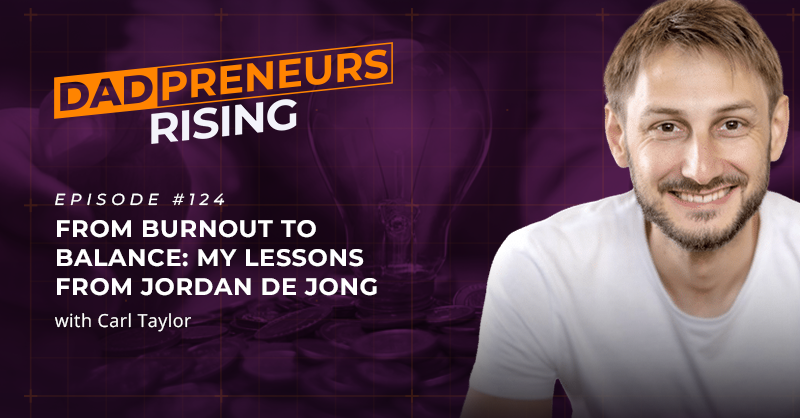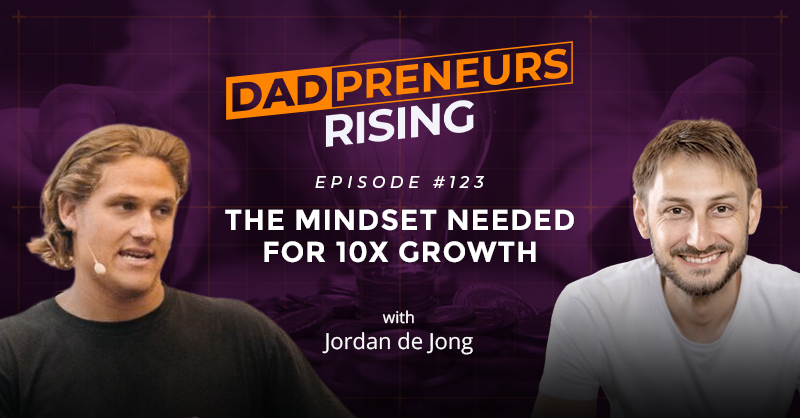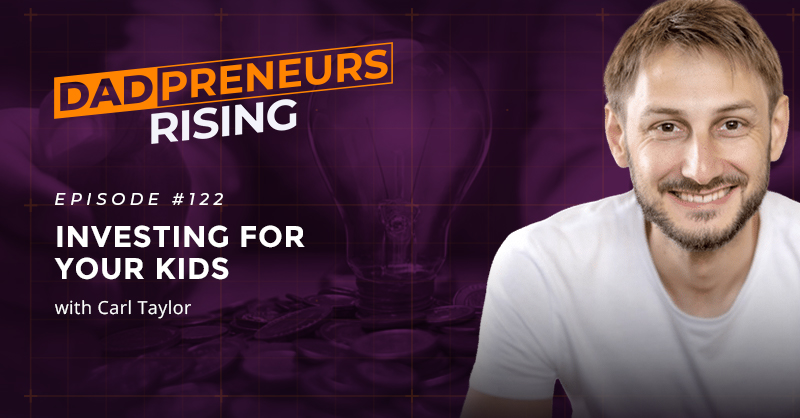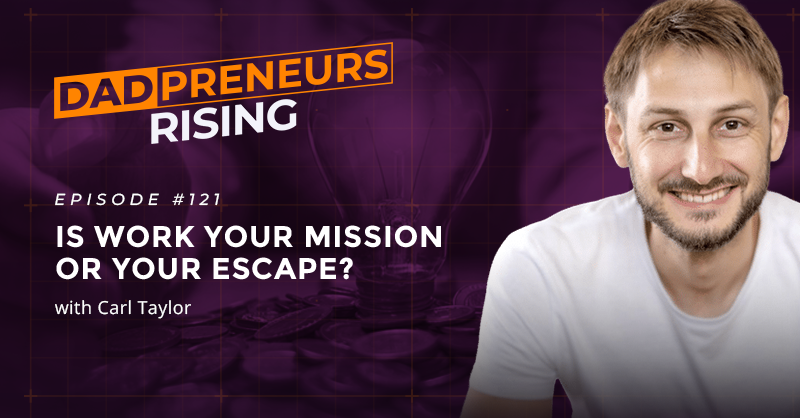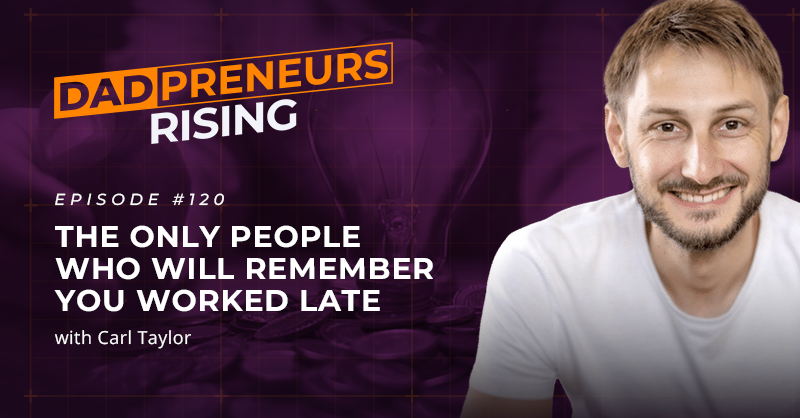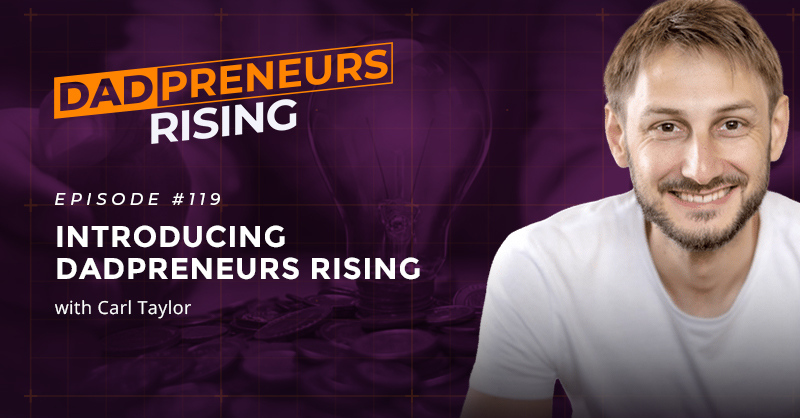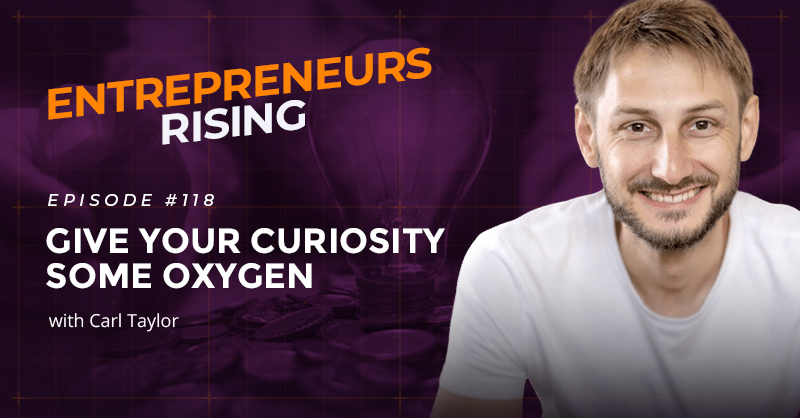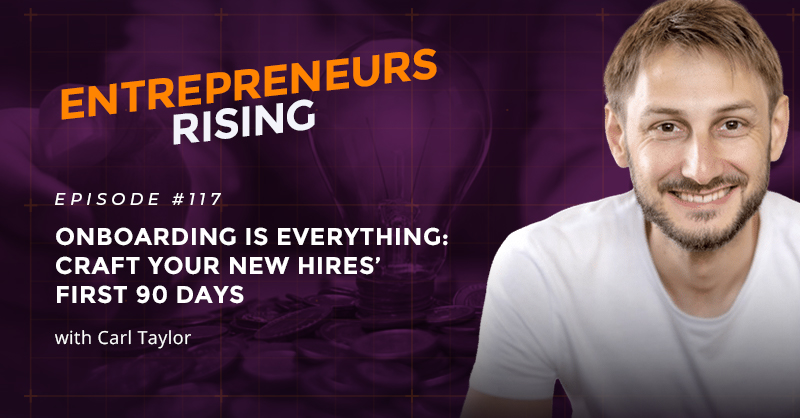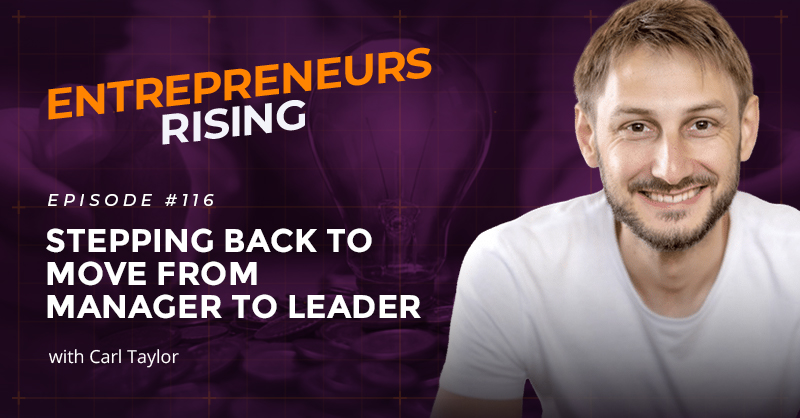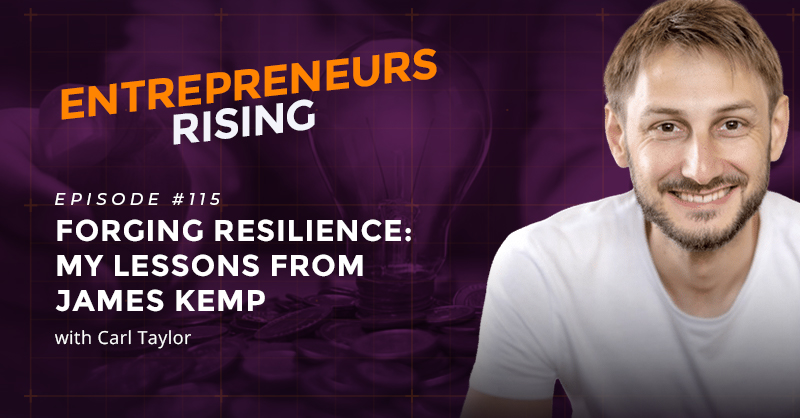Do you feel that your business takes up too much of your time every day? Are you craving the freedom that lets you focus on self-care, mental health, and relationships?
If so, stick around because this episode offers practical tips on how you can be the true King of your business — not just its operator.
In this episode of Dadpreneurs Rising, Carl interviews Jordan de Jong, a property investment advisor and founder of Australia’s largest online property portfolio mapping software, Gameplans.
Jordan shares how becoming a new dad was the catalyst for him to leave his corporate job and start his own business despite not yet knowing what he wanted to do. He began by contracting for various emerging buyer’s agencies and using his tech and data analytics background to help solve their problems, specifically in mapping out and systematising investment property portfolios.
The rapid growth of his business was a pat on the back for Jordan, but it also meant working 12+ hour days in the early stages, which he admits negatively impacted his relationship at home. After being encouraged to delegate tasks, Jordan now follows the “automation rate” principle to run the numbers on hiring the support he needs.
Being an entrepreneur may be extremely rewarding, but it can take a toll on your personal life. This episode will expose you to the value of the mindset shift from grinding “in” your business to strategic plays that can help you 10X “on” your business. It will encourage you to boldly pursue your passions and purpose.
IN THIS EPISODE, YOU’LL DISCOVER…
- Who is Jordan de Jong? (00:30)
- Jordan’s backstory (02:57)
- The origins story of Gameplan (05:52)
- How Jordan’s business impacted his relationship (14:06)
- How Jordan prioritises work life integration today (19:03)
- What is an automation rate? (21:44)
- What a typical day for Jordan looks like (23:13)
- Important things that started to shift in Jordan’s perspective (26:16)
- The four key areas of the Dadpreneur Program (30:45)
- The advice “now” Jordan would give young Jordan (34:09)
- How to get in touch with Jordan (36:18)
QUOTES
“The best thing I ever did was learn about sales and marketing. Follow up emails and sequences and everything else like that. Ultimately, that’s what has really generated and created my business over the years.” – Jordan de Jong
“You can create any sort of business that you want to create. But if you think about things the right way, and the strategic way and think much bigger than just like, how do I get the next sale or the next lead, you can generate a whole lot more income for the same amount of effort and get there over a little while.” – Jordan de Jong
“If you want to be the king of your business, you need to be the owner, not the operator.” – Carl Taylor
RESOURCES
The Lean Product Playbook
10x Is Easier Than 2x
Jordan Peterson
About Jordan de Jong
Jordan de Jong is a Qualified Property Investment Advisor, who continually works with some of the most renowned property experts in Australia to build out strategies and review existing property portfolios for their clients.
Jordan has seen over 3,000+ property portfolio’s, his passion is educating clients on the powers of residential property and has built Australia’s largest online property portfolio mapping software called Gameplans, which allows investors to build out their scaleable property portfolios.
Get In Touch With Jordan de Jong
WHERE YOU CAN FIND CARL TAYLOR
Automation Agency
CarlTaylor.com.au
LinkedIn
Facebook
Twitter
TRANSCRIPTION
Jordan de Jong: The cool thing about being with these guys that had been in business for maybe two to three years now is they were kind of that one next level ahead of me in business. And so I got to learn from them as they were going through their different stages. And that’s when I got to read some different books and got some recommendations about what I should be doing.
Carl Taylor: Hello and welcome, everyone, to another episode. I am your host, Carl Taylor, and today we have another great conversation episode. It’s not just me sharing some stuff, but we’ve got an amazing guest and I, actually should have asked him this before I hit record, but how do I pronounce your last name, Jordan?
Jordan de Jong: It’s de Jong. It’s a silent J Diong.
Carl Taylor: All right, so it’s Jordan de Jong. And, let me tell you a little bit about Jordan. Firstly, I first met Jordan last year at a snow retreat. Well, technically we weren’t in the snow yet, but it was the first night dinner of a snow retreat and we were just having a great chat on that first night walking from the hotel down to dinner. And Jordan was just kind of sharing his journey of what he’s done. And that’s what we’re going to unpack a little bit more on today’s show. Jordan is a qualified property investment advisor who continuously works with some of the most renowned property experts here in Australia to build out strategies and review existing property portfolios for their clients. So he’s all about property. What he doesn’t say here in his bio is he’s also all about software and tech. Jordan, on the property side of things, has seen over 3000 plus property portfolios and his passion is in educating clients on the power of residential property, in particular here in Australia. And he’s built Australia’s largest online property portfolio mapping software. I’ve actually used this software. It’s called game plans and it allows you to build out scenarios, model different scenarios. And I was able to use this software, game plans. Personally, I was sitting in this conundrum of which route did I want to go. Negatively geared, positive cash flow, commercial property mix of the above. And I was able to map all those different scenarios over the next 2030 years of different acquisitions I might make, following different strategies to see the end result in cash flow, in capital growth, in everything. And it’s just a really great tool. So kudos to you. So welcome, dude. Thanks for coming on the show.
Jordan de Jong: Thank you. What a wrap. And yes, I do reminisce about that, discussion we were having late one evening walking down the pathway. But it was really, really good. I got to learn a lot about you and what you’re up to and what you’re doing and love your journey as well, but, yeah. Keen to unpack it all today.
Carl Taylor: Thanks, man. Well, yeah, look, as you know, I’ve taken a keen interest since I became a dad, and I know you’re not that long into being a dad either. For me, there was a big aha of being an entrepreneur for 20 something years before becoming a dad and then becoming a dad. There was this big aha of what changes and what’s different once you become a dad. So that was my journey. I had been in business for most of my life, since I was 15 before becoming a dad, but I know for you it was different. So let’s maybe start there. Just start sharing that story.
Jordan de Jong: Yeah, 100%. So backstory. Went to school, finished year twelve, went to uni, studied a bachelor of construction management, and slotted into my first corporate job at 19, I think. And I think I was earning like 20 grand a year or something.
Carl Taylor: Crazy.
Jordan de Jong: I was only doing one or two days and just getting paid nothing. But, it was a typical growing up experience. And I suppose what equated from that was me spending ten years on the corporate ladder. And I loved it. I grew my way up the ladder. I ended up getting my income to above six figures and grew my way up through the hierarchy of the business. But I, ah, had the complete opposite story. So for me, we ended up having our daughter, summer. I think I was about 29, and I remember once we had her, I was holding her in my arms and I looked at her and I go, oh, my God, this was me 29 years ago. Like, how flipping short is life? And at the same time, I had my dad come to visit me not too before then. And I could start to see, hm, him getting a little bit older, like he was 60. Now he’s starting to deteriorate. He wasn’t as quick and snappy as he always had been. And I was like, man, another 30, years, I’m going to be there. Like, how flipping short is life? And so in the back of my head, I always knew I wanted to start a business and I knew that I would do it someday. I just had no freaking idea what I was going to do. But that was ultimately the moment for me to go, wow, life is way too short. And if I don’t pull the trigger and make a move now, I don’t think I’ll ever do it and I’ll get too comfortable, and I’ll have this really nice automatic income that comes through from a normal job, and I’ll never pull the trigger to actually step out and make a decision to start the business.
Carl Taylor: if not now, when kind of thought process and I couldn’t relate. I’m sure many others listening can of seeing your parents now, I’m in my late 30s, but, like, seeing your parents and you see them as older, you just see how old they’ve not old, but how much older they’ve gotten. And it is, you kind of go, oh, okay. My time with them is limited. And as you said, I’m not that far from becoming that. That’s only another 2030 years away. So, yeah, dude, it’s so crazy.
Jordan de Jong: And then you think about their parents and how they’re nearly getting to, some of them are passing away, they’re really getting old and injuring themselves. And it’s just like that. I just really had this moment of like. And it was almost like overnight. It was really weird. It’s kind of like I had matured and then kind of looked at everything and just went, wow, this is such a short life. So, yeah, 100%.
Carl Taylor: So when you chose to start a business, did you just throw in the towel corporate world and go, I’m in business. Or did you kind of stagger it? Or how did you actually go about the mechanics of. Because you said, what am I going to start? How did you land on what you’re doing?
Jordan de Jong: Yeah, well, I like to tell people that I just said that I quit and left, which I kind of really did. One day I was like, I’ve had enough. I’m out of here. Here’s my four weeks. And I really had no idea what I was going to do. That’s the honest truth. But there is a little bit of a backstory. So five years prior, I started a property podcast, and I would have been like 23, 24 at the time. It was all about younger people getting into the property market. And through that podcast over two or three years, I met heaps of really cool people. I met people that were my age who had property portfolios. And funnily enough, behind the scenes, there was this industry called the buyer’s agent, which is kind of a new industry in Australia, very big in UK and America, but that was really growing behind the scenes. And so all these guys that I was getting on the podcast actually ended up becoming buyer’s agents. And so when I stepped off the corporate ladder, I had no idea what I was going to do. But what I did have is a whole bunch of 25 to 35 year old young dudes who are all starting businesses and super, super hungry. And I know we’ll probably get into this a little bit later on, but I kind of saw that as a bit of an opportunity and I thought, this is a new industry with young people who are keen that understand technology. I studied construction management, but I ended up getting into data and databases and analytics, ended up becoming a data science at the company that I was at. So I had these tech skills behind the scenes that I had building, and so I was like, okay, well, there’s got to be some sort of tech that I can build for these young guys in a new industry that’s going to help them and solve their problem. So for me, what I did was I ended up just calling up five or six of them that I was really, really close with. And I said, look, I’m leaving my corporate job. I’m not sure what I’m going to do, but can I contract for you guys and do some things and sort of see how your business is going to roll? Now, I could have become a buyer’s agent, but I don’t really, like, I’m an introvert. Like a massive introvert. It’s funny, Carl talking about the story of our snow trip. Like, we went away for four or five days with 16 people, and by the end of the trip, I was like in the corner eating my lunch by myself because it was just too much long. so buyers agency wasn’t for me, but I was really good at the tech side of things. And so let me contract out to you guys. Let me kind of just see what I might like to do within your business. And so I was working for like four to six different companies at any one point in time. And I wanted to go through every different stage, like, see where their biggest problems were and where the commonalities between their problems were. And there’s a few. Like, there were some CRM issues, there was some report issues, there was some getting data and analytics on the property market around Australia, which was really, really cool. But the one thing that was such a big problem that came up for everyone is every client comes to us wanting to build out, an investment portfolio. But we were spending, or they were spending two to 4 hours per, lead. So they weren’t even a client yet, showing them how to build a portfolio just to give the client the confidence that they could go out and build them an investment portfolio that would ultimately get them to their goals of worth. Of passive income. And so this two to 4 hours per lead was actually really taking up a lot, a lot of time for them. And so this is what I focused on. I just doubled down. I said, everyone is having the same problem. Let me run the sessions, let me understand what actually is going in behind the scenes. I had built my property portfolios on the corporate ladder, and I had built like this massive spreadsheet that would tell me when I would be able to retire. So I’m very analytical, and this is something that was already kind of running in the background, but I was like, well, how do I take this spreadsheet and help other people do it? And I really fell in love because I have that analytical background with building out the whole strategy side of things. So I identified the problem. I just wanted to completely understand the problem. So I contracted out these guys for about six months, built this ginormous freaking Excel spreadsheet that would solve every single problem and deal with all the issues and really get them towards their goal. So I solved the problem for them. The secondary problem that would come up to that is if you send an Excel spreadsheet to someone, they’re going to tamper around with some calculations, they’re going to edit some things, they’re going to put some data in incorrectly, and generally you get this ensemble of things back that doesn’t make sense and add up. So given the tech background, I just said to everyone, look, give me six months, I’m going to go away, I’m going to go build this software in the background and then I’ll bring it to market once it’s ready. So I went away, did that, brought it to market, essentially turned the Excel spreadsheet that I had into this platform. And they loved it, everyone loved it. All six of those companies implemented it straight away. We got a really good market validation because clients now had the ability to have a portal that they could log in and it felt like it was the business’s portal. We were able to white label it. It felt like a more ingrained process altogether. I was then able to scale from giving my time to doing these sessions, to giving people the power to do it themselves, essentially, with also having someone to back and teach them and learn how to use it. I was able to take away from my time, which wasn’t scalable, teach other people how to do it so they can do it in their own time. But then we ended up going from six businesses. I think in the first three months we were at about 20 or so. First year we’re probably at about 50, which was crazy. And now we’re two and a half years in and have over 150 businesses that we work with across Australia.
Carl Taylor: Love it.
Jordan de Jong: Yeah. identifying that problem at the start.
Carl Taylor: And one of the things I’m curious about is all of those things you did, the kind of the data validation, digging in, finding your initial clients, was any of that strategically planned because you’d read books about the lean product playbook? Because that’s kind of effectively what you follow, the lean product playbook right there. But did you do that consciously or did it just seem to happen?
Jordan de Jong: The funny thing is I hadn’t read like a tech book beforehand or like any sort of business book. I didn’t even have any business experience. And I think the best thing that I did for, someone listening who hasn’t started a business yet or might be in the early stages of the business, two of those contracting jobs that I did actually included sales. And so I would do the sales for these businesses and then I would provide a strategy for their client as well. And that was honestly the best thing I ever did was learn about sales and marketing and follow up emails and sequences and everything else like that. Ultimately, that’s what has really generated and created my business over the years. So I, I hadn’t read anything. I hadn’t learned anything. And so I was just kind of learning as I was going. Not being on the corporate ladder, you don’t learn any of that stuff. So I was learning as I was going. And then the cool thing about being with these guys that had been in business for maybe two to three years now is they were kind of that one next level ahead of me in business. And so I got to learn from them as they were going through their different stages. And that’s when I got to read some different books and got some recommendations about what I should be doing, get to meet people like you. And actually, my favourite book ever is ten x is easier than two x. And you were the one who, told me to read that, good book. Yeah, it’s amazing. So, yeah, it wasn’t probably until I just went hard. I was spending 12 hours a day, minimum working. Whether I was on a call building the product, talking to people, talking to clients, I was literally learning as I was going. And it probably wasn’t until maybe twelve months in where I slowed down a bit and said, okay, the business has proven. How do I actually build a business now?
Carl Taylor: Well, let’s go there for a moment because that’s an interesting place for you to bring up because obviously you’re a new dad and here you are spending twelve hour plus days on your business. Firstly, how did that impact your relationship?
Jordan de Jong: Yeah, it’s a really good question. This was in the middle of COVID and so it’s a bit of a journey, so I’ll take you through it. This was kind of in the middle of COVID and my wife is italian and we often used to live in Melbourne. Now we live in Gold coast and we’d often go for dinner there maybe once or twice a week. We really got on with the family. We’d all have this really nice family get together and dinners and everything else like that. And so in the middle of COVID where we couldn’t catch up to each other, Melbourne was completely locked down and everything else like that. My wife and I decided that we would get, a really large house and we’d all move in together. Now, it wasn’t the whole family. It was just my wife’s parents and us. And we had summer at the time, which is our daughter. And so that’s what gave me the flexibility and a little bit of a mental cheque just to go. Okay, well, we’ve got four people in the house. The grandparents are around. My wife’s amazing. Like, she’s the best mum in the world. But she also had support from her parents and her mum whenever she needed it as well. Which was really great for summer because she got all of this support. But it wasn’t the best for mine and someone’s relationship because I’ll get there next.
Carl Taylor: Yeah.
Jordan de Jong: Because I was just super focused on the business and I wasn’t spending as much time as I should with her. And same for Renee as well. My wife, she was spending all the time with summer that she needed to. And then to get her steam off, she was kind of talking to her parents and I was just in the room coding something or on the phone or something. So I wasn’t spending a lot of time with her as well. And look, we have a really great relationship. It didn’t impact us in terms of we were fighting or she was upset that we weren’t getting time together. And you really couldn’t see it at a surface, level. But it wasn’t until we actually moved to the gold coast and it became just me, her and summer again, where I realised we’ve actually lost a fair bit of our relationship that we had when we were just together. And it was just us two. And I was spending the nights working like I’d still be working at six or 07:00 where renee had summer all day and she was exhausted and she just wanted to be relieved. And I was just kind of like, oh, no, I’ve always just worked and I didn’t really have that. It took me a little while to go back and, like, renee needs help after work. I need to stop working and spend time with my daughter and my wife and just get to know them. So I was blessed in the fact that renee had support around her, which was really handy to help me allow me to continue to build the business. But if I had my time again and we didn’t have that, like, it’s something that I would change completely. It’s time that I would never get. Look, you know, she was a baby and she’s not going to remember it as such, but for me, I felt like I’d lost a bit of time with her in her early days. It’s been great because we got a really good relationship now, but definitely did have an impact, for sure.
Carl Taylor: Yeah. It’s interesting because anyone who’s in business, you’re trying to balance this. It is like a baby, especially early days of the business. It’s very needy baby, just like a real baby. And then as they get older and you set things up, they don’t have to need you as much. Right? Like, my business needs me 4 hours a month. That’s very different to the early stages. So you had this new baby of, a business, and you had a new baby. And so you’ve done what frankly, many men do is all the energy and focus goes on the business baby, and the home life gets a little bit left. And as you said, what you’re saying of like, oh, it wasn’t like we had more fights and stuff. That’s quite normal, too, for many men, I find. But it’s that when you finally go, hey, actually, when you come up for air, you go, hold on, we don’t have the relationship, we don’t have the connection we used to have. I don’t know my kids, my kids don’t know me. And so, the fact that I know you’ve, in a very short period of time, what you have done is amazing, and in my experience, quite rare in the speed of which you’ve been able to have the success you’ve had, which is amazing. You had all this background that’s allowed you and paid off to allow to create what you’ve created. Not everyone listening to this had that for their own journey. I definitely didn’t have that for my journey. And if you’re listening to this going, oh, cool, I’ll be able to do it. Absolutely. The fact that Jordan’s done it shows it’s possible. I just want to set that context, though, that in my experience, it’s not the norm. That in a short period of time you were able to get to a point where now you can step back a little bit. I remember we had this conversation, I think it was late last year, and you were like, yeah, there’s not many people who can relate to it, but you were kind of like, well, I’ve kind of got a lot of money and I’ve got flexibility. What do I do with that? So let’s fast forward, I guess, to right now. What does your time look like? You were spending 12 hours then. What’s it like now in terms of business relationship, spending time with work life balance? I like to think work life integration, but what’s that look like now?
Jordan de Jong: Yeah. And honestly, if you’re listening to this, you’re at a good place because Carl’s had a massive impact on that whole philosophy for me. So I remember on the way up to Ozcon, I don’t know if it was you, but someone was grilling me on, like, why don’t you hire someone? Why don’t you get someone to do something else? Because I was just wearing all hats, right? That’s all. I’d never known I’d learnt sales, I learned marketing, I knew how to code, I, was understanding business and so I just felt like I could continue to do it all forever. And so, yeah, I just went through this season of, there was another guy on the trip called Jack who runs quite, a large software company over in America. And he said, go cheque out this website, you’ll be able to find some developers, they can help you out with some stuff. And I was like, I don’t know. And then I think you or will were talking about looking at getting a VA and having some VA do some help around that sort of stuff. And so I kind of tested the water a little bit and dabbled my feet. It was funny, I was saying like, oh, I’d love to get, a developer to help me do X, Y and Z with the platform, help with some authentication or stuff, stuff that I just don’t enjoy. Like I like working on the modelling, not like the login process. And I was like, oh, I’d love to just test the waters with that. And he goes, mate, you’ll test the waters and then you’ll think of something else that they can do, and then you’ll think of something else you do. And then you’ll realise that actually there’s a full time role here. And then you’ll realise that actually full.
Carl Taylor: Time roles, all three of them, actually.
Jordan de Jong: Doing things all the time. And so for me, it was such a valuable trip and just an understanding and just getting a different context on how it all works. And there’s this methodology in ten x is better than two x, which is essentially just writing down everything that you do and then highlighting the 80% of things that are taking up most of your time and highlighting the 20% of things that are progressing you or moving you forward or moving the needle for you. And so I just went through this really big process of saying, like, I love coding. There’s nothing more in the bottom of my heart. I love just switching off for the day, headphones on, and just coding for 12 hours. Like, that’s my dream day. But it also takes up all of my time. And so I had to plate that back down. Sales, I had to move on. Actually doing the strategies, like one on one with clients, I had to stop doing. And these are all things, these are all hats that I was wearing forever. But I really highlighted and I went, well, those 12 hours are actually consumed by all these things that I can actually just pay someone else to do. And I think you were actually talking about running the number on your automation number or whatever it might be.
Carl Taylor: Automation rate?
Jordan de Jong: Yeah. Do you want to give us just a gist of that so I don’t.
Carl Taylor: Yeah. In general, your automation rate is effectively what you can afford to pay someone to free up an hour of your time. Right. And I think there’s a previous episode where we’ve gone through this already, but in a nutshell, you’re looking at taking your owner’s hourly rate. So you figure out, what’s your salary, how much are you taking out of the business? Right. That’s everything. Profit, salary, business expenses. Dividing that by the number of hours you work per week and the weeks you work per year, that’ll give you your owner’s hourly rate. That’s how much you earn for your time. That’s what you’re putting in time for money. Then to get your automation rate, you divide that by a multiple of either two or four to figure out what’s the return, because you don’t want to just go, cool, I’ve paid someone the same amount as me. You haven’t made any return. You want to actually get a return on your investment as you would in any investment. So you’re looking for either a two to a four times return on your time. And so let’s say you got an hourly rate of $100, and you were, looking for a four times return. That means you can afford to pay $25 an hour to someone to free up that hour of your time. And when I say an hour, I’m not saying, like, you can pay that person $25 an hour and they take 3 hours to do something. You can do it in an hour. I’m saying you can pay $25 to get an hour of your time back. And so if they take 3 hours to do it, but it frees up your time, it would be that 25 divided by three is effectively the hourly rate they should be earning. So that’s in a nutshell. I think we’ve got some other episodes, but that’s the general journey of it.
Jordan de Jong: Yeah, 100%. So that was just a really big breakthrough for me because I ran the math and I was like, I’m so silly not to pay someone 25 hours, even if it does take them longer to take this off my hand. And so I slowly chunked off those things one at a time. And now my day generally looks like I get up at three or four in the morning just because I naturally get, up with the sun. That’s a thing that I enjoy to do. I’ll work between maybe like, three and six in the morning, and that’s like, my really good working time because everyone in the house is asleep, no one’s calling me, no one’s sending me email. I was like, it’s just really efficient working time. And then between 66 37, 38, I’ll spend with my daughter. So get her up, give her breakfast, take her to daycare, whatever we need to do. 830, I’ll go to gym. 930, I’ll go to the beach, get home at like 1010 30. Have I, eat once a day now? I’m still on the carnivore diet, but I’ll eat once a day. So generally after I eat, it’s like 1111 30, and I feel like the day is done pretty much. But after, say, 11, 11 30, between then and maybe four, that’s kind of when I do any of phone calls that I need to do or follow up with the team and make sure that they’re all running things efficiently, answer any questions that I need to do, have podcasts like this. Essentially any communication sort of thing will happen in the afternoon. And then after four, I’ll pick daughter up from daycare and spend the rest of the day with her. So, yeah, 12 hours is essentially condensed down to, like, three really solid working hours, and then the businessy, phone cally, podcasty stuff I’ll do in the afternoon, which I generally don’t. I mean, it is work, but I love having a bit of a yarn to people anyway.
Carl Taylor: And there’s a difference between working in a business and on the business, right? Like doing things like podcasts, strategic partnerships, those sorts of things can be a lot more on the business work as opposed to in the nuts and bolts of the delivery, the customer support, all of those kinds of things. So, yeah, it’s amazing what you’ve been able to do to go from that in such a short period of time and to have that balance now between spending time. You can see the distinction in what you’ve described there. I personally do not want to wake up the time you do, but the way you’ve crafted your day, it gives you a lot of flexibility to be there for family, to actually have some white space. And so it’s just huge. Hats off to you for what you’ve done there. What I’m most curious, I guess, is going, okay, now that you’re at this point where the business doesn’t need you as much, how are you finding the hunger, to move to the next level? And is your focus purely on business now, or have some things started to shift? Because I know with my own journey that when I finally kind of got a chance to step out of business, it’s almost like light bulbs turn on and you start to see there’s a lot more in the world than just business. Has that been your experience?
Jordan de Jong: Yeah, definitely. So apart from doing the 12 hours and then having that lesser of a relationship with my daughter and wife, when you sit down behind a computer for 12 hours a day, you start to put on a little bit of weight. And so I’ve always kind of been a bit of a gym guy. Like, I’ve always gone to the gym, but I was still going through the gym. I was kind of in and out. Like, I’d be going for half an hour or 45 minutes. It was just to get in and out of the gym, but also, well, two things, actually, which is pretty crazy. But I did end up putting on a bit of weight. So when we moved to the Gold Coast, I think I was about 108 kilos or something like that. Not huge, huge, but I started to really get there. And the second thing is, in the middle of COVID especially when I was on the phone for more than like 10 hours a day, I would get off the phone and I would just be so mentally exhausted. I’d feel like a drink to just help me decompress and get through the season. So during COVID I got to a point where I was drinking like, yeah, I mean, like two bottles of gin a week. It was crazy. I’m not much of a drinker. I don’t really drink. I don’t get drunk and I wasn’t really getting drunk of it, but I really was drinking a lot just because it was affecting my mental state and I recognised that I was doing it to get me through the rest of the day and to get me ready for the next day just so I could mentally completely zone out. And so there are two things that I really identified when I started to come out of it as like, this needs to change. I didn’t feel great about it. I felt sluggish and overweight and I didn’t feel great. And so, yeah, after I had a little bit more of my time back, I reflected back on where I was in the weight. I’ve completely stopped drinking now. I don’t drink alcohol. Maybe on occasion, on a special occasion or something like that, but I have no desire to drink. We don’t drink at home or anything, which has been awesome. But also really got back into the gym and as I mentioned, sort of on the carnivore diet and really been dieting. So now I’m back down to 94 kgs. So lost about 14 kilos or something like that. And that has predominantly become my main focus of a day. Yeah, work is important. If something stuffs up at work, I want to get on top of it. But that will never come in between getting to the gym or going for a walk or eating healthy. Just because I feel like regardless if you have wealth or success or friends or family come and go within your life, your body is what stays with you regardless. Right. And so that should become first because not only do I physically feel better, not only do I mentally feel better, but I just feel more prepared and more excited and more energised every single day to focus on what I need to focus. And so it’s helped me really think about not working in the business and working on the business. So, yeah, for me now it’s more less about the cogs of internal the business. It’s just making sure that I’m always in the best mental state and physical state that I can possibly be for every day. What I’m thinking about when I am working is just like, how do we ten x this? Instead of going, oh, we did ten leads this week, we need to do 20 leads a week on average next year. When you’re setting your goals, it’s like, actually, what are the things I can do in this marketplace that are just going to completely revolutionise the business? What are the big plays that I can make that, yeah, it might cost me some equity, yeah, it might cost me a significant amount of return, but it’s such a big play that it’s going to have a ten x return. So that someone said this, I can’t remember who it was, but essentially creating, a billion dollar business and creating a million dollar business is exactly the same effort. It’s just thinking about things differently and that’s really impacted me, where you can create any sort of business that you want to create, but if you think about things the right way and the strategic way and think much bigger than just like how do I get the next sale or the next lead, you can generate a whole lot more income for the same amount of effort and get there over a little while. So a big focus for me is family, health, and just thinking a little bit more outside the box with business rather than grinding in the business.
Carl Taylor: I love it, man. And what I love about it is I shared with you just before we hit recording that as part of our Dadpreneur programme, we focus on four key areas, right? You got business, and so how do you be the owner, not the operator, of your business, right? like, if you want to be the king of your business, you need to be the owner, not the operator. And I can see the mental shifts for you in such a short period of time have allowed you to start to see like that, act like that. And it’s showing up in the amount of time you now have available and how you think about business. And then in relationship, it’s about how do you lead, not follow? How do you actually step up as the man to lead the relationship? Relieve your family, lead your kids, to give them the promised land, to give them a better life that they deserve? And then in the health side of things, how do you command your mind, your body, your emotions, rather than yield to them? Like the fact that you were needing your vices of. And we’ve all got them, we’ve all got our vices, right? For some men, it’s pornography, for some men it’s gaming, for other men, it’s business itself, right? We’ve all got it, whether it’s alcohol, weed, whatever. And so you got to be able to overcome those and command it. And they can see that, that you got to the point where you’re like, no, this has got to change. I need to do this. And then finally, in wealth, which is the place that your business actually sits in, which for us, we talk about, you need to protect and not risk, because you’re already taking so much risk in business. Business is a highly strong, powerful return, and in some ways, the risk can be mitigated the smarter you get or the more educated you get and the people you have around you. But it’s still probably one of the highest risk assets you can own, but you have a lot more control over. So you want to make sure that outside of business, that you’re focusing on things that protect your family, protect you. And I know we didn’t touch on it, but you already have a, property portfolio as well. You’ve got all these pieces in place, and we haven’t personally known each other a long time, but knowing your journey and the conversations we’ve had, I really am, hats, off to you for what you’ve created. And I love where you’re at, and I love the problem that you’re solving. You found a true need that people have. And so while you’re solving it for the buyer’s agents, which are the people who value it, this is a need that anyone who’s trying to build a property portfolio truly is like, how do I plan this? Once you’ve bought your first, maybe your second. Once you get past two properties, you start to go, okay, well, as long as you got the cash flow to keep you going, what do I do with it? How do I actually continue this journey in a way that’s sustainable and that’s exactly what your software does, obviously, for people want to find that. Gameplans.com au is the website. Before we kind of wrap things up, though, I would love to go, I guess, a little bit on the practical. You’ve mentioned a lot about ten x is better than two x book. You’ve, mentioned about how you started hiring people. But if you were to go back and give advice to that Jordan, who was just, he’s just got his daughter in his arms, and he’s looking at her and going, wow, I was like this. And remembering that your dad’s looking a lot older, and you’re like, oh, I’m only 30 od years away from that. If you could go back to that moment and you could whisper something in Jordan’s ear. what would you tell him? What would that advice be that you would give to that version of Jordan?
Jordan de Jong: Yeah, I think if it was just one little whisper, it would, like, just go do it. As you said, it’s risky in business. You are taking steps out. You are getting, you know, jordan Peterson’s got this really good quote, and I can’t remember it off the top of my head, but it’s something about, like, the thing about life that’s so interesting is that you’re all in. No matter what you do, no matter where you’re at, you’re all in on this thing. This life is going to kill you one day. So why not just play the most magnificent game while you’re here? And I’m getting, like, I’m, choking up about this because it’s like, I get really emotional about it, and it’s such a strong statement. It’s like, we’re here. This life’s going to kill us. Why not, just do the best that we possibly can while we’re here? Because we’re just going to die one day anyway. I would much rather. I have been a gamer in the past. I’ve played of World of Warcraft for 18 hours a day. You think 12 hours a day is bad? Go back and watch me playing World of Warcraft. I’ve been there. I’ve done that journey. But if you can just turn that energy and turn that time and turn that concentration into building a business that you love and enjoy and you thrive in, it’s got such a better outcome than wasting time and playing video games and stuff like that. Don’t get me wrong. Occasionally I’ll play a video game on a weekend just to debrief. But, yeah, man, we’ve only got one life. It’s super short. It’s going to kill us. Why not just play the best game while we’re here?
Carl Taylor: That’s a really good piece of advice. And it’s true, right? We are in this one life you, mentioned before. We have this one body. Like, how we show up controls whether or not our relationships stay with us, but we can’t control whether they pass away and all those things. But you’re right. As long as we’re alive, that body’s there, and we’re in this moment, no matter what. I, like that. It’s a really cool way of putting it. So I think this is a good place to wrap, man. Like, I love your journey. If people want to connect with you, obviously we’ve mentioned gameplans.com au. Where else can they find you? Do you have know what’s the connection?
Jordan de Jong: Yeah, probably super active on LinkedIn and Facebook. So you’ll be able to find me there.
Carl Taylor: I’ll give you my show.
Jordan de Jong: Yeah, so just Jordan Diong. or you can shoot me an email if you want to. Just [email protected]. Au happy to, just mention the podcast and we have a bit of a chat and catch up. But yeah, all social media outlets, I love it.
Carl Taylor: All right, well, thank you for tuning in, listeners. I hope you’ve enjoyed this conversation as much as I have. Huge thank you to Jordan for his wisdom and sharing his journey. If you want to get the know, if we said something and you’re like, I can’t remember that. What were those different things that were mentioned? You can find a transcript, you can find links, you can find basically a whole summary of this episode over at the show. Notes which are at rising show. Rising show. And if you’ve been listening to this for a while and you haven’t left us a review yet on Spotify, just click us the star rating. I’d love it to be a five star, but if it’s not worth five stars, that’s okay. Just give us whatever you need. And if you’re on Apple, you can leave a little comment. That would be amazing. But most importantly, if there was someone who came to mind while you were listening to this or watching this on YouTube, and you’re like, my friend needs to hear this, or my brother or my dad or whoever, someone came to mind is like, they need to hear this. Grab the little link, shoot it to them. Because one of the best gifts you can give them is expanding their mind by exposing them to this stuff. It’s going to help them. It’s going to help me build the show. And ultimately, you’ll probably get some credit too, for helping expose them to their stuff. So if you haven’t already, think of that person and go and grab the link and send it to them now. All right, until next time, keep up the journey. Hey, fellow dadpreneurs, thanks for tuning in to today’s episode. If you’ve missed something said on today’s episode, you can find transcripts, links, and other notes from today’s episode, as well as to all other episodes over at rising show. That’s show not. So. Head over to rising show to get all the information that you need. Close.
Like this episode? Have topics that you would like us to discuss? We’d love to hear your feedback and comments. Let us know by leaving a comment below.
